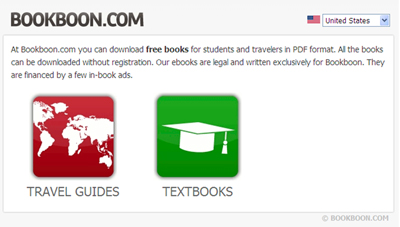Ideas such as collaborative development, information sharing, and social computing have powered Web 2.0 innovations for several years. Among these recent advances are new ways to create and distribute human knowledge. This has begun to dramatically change how books are written, published, and distributed. Although mainstream textbook publishers have resisted change, new paradigms are emerging. One exciting example is BookBoon (BookBoon.com), run by the Danish company Ventus Publishing ApS.

BookBoon provides a new method for educational-material delivery compatible with the future of ubiquitous information, accessible by everyone. Its revenue stream removes the burden from students and finances textbook distribution with advertising space sold to carefully selected organizations. Rather than digitize existing printed textbooks, BookBoon works with authors to develop new material according to guidelines that more closely resemble how modern students use books.
In general, BookBoon places ads on select pages of the online books and then tracks usage, downloads, and clickstreams. Revenue is shared with book authors. Using BookBoon’s system, authors can update books quickly and efficiently, ensuring students’ access to current material.
BookBoon has partnered with K-State’s ELATEwiki to provide free, downloadable textbooks to K-State students. Current topic areas for the books offered are limited but growing every day.

A current focus of BookBoon is to locate faculty members interested in authoring new material. At K-State, Professor Roger McHaney is preparing Understanding Computer Simulation slated for publication by BookBoon/Ventus in January 2010. This book will provide a background in discrete-event computer simulation for business and manufacturing courses.
Jeff Levin, co-owner of Varney’s University Bookstore, sees the future of textbooks moving in this direction and has been developing new capabilities to support anticipated student demand. “We recently invested in equipment, training, and technology to allow us to partner with companies such as BookBoon and provide students with high quality Print on Demand Services (POD) through Able Printing located in our Aggieville store,” says Levin. “Not too far in the future, students will have the option of using online books or walking into Varney’s and having new hardcopies of the text in their hands in a matter of minutes. The publishing and printing worlds have an exciting future, and we are working hard to ensure students are supported in the best way possible.”
Another online organization cooperating with BookBoon is TextbookRevolution.org, a student-developed and -operated textbook-consolidation site with a goal of increasing use of free, shared educational materials. The site focuses on students, teachers, and professors. It tracks the popularity of various textbooks and helps bring attention to the best, no-cost classroom-material options.
While BookBoon and TextbookRevolution are focused on the academic world, the best-known general source of free, new online books (including textbooks) is the social publishing company, Scribd. Scribd.com reports that more than 60 million people visit its website each month to share original books, documents, and articles. Scribd has been called the “YouTube” of the written word and has a vision of “turn[ing] everyone into a publisher and creat[ing] the best possible reading experience on the web and mobile platforms (www.scribd.com/about).” In addition to providing free e-books, Scribd also sells commercial works of fiction and nonfiction for Web and mobile platforms.
While various models for textbook development and distribution remain debatable, there is no doubt that these are interesting times for publishers and students. For more information about the future of textbooks, see: